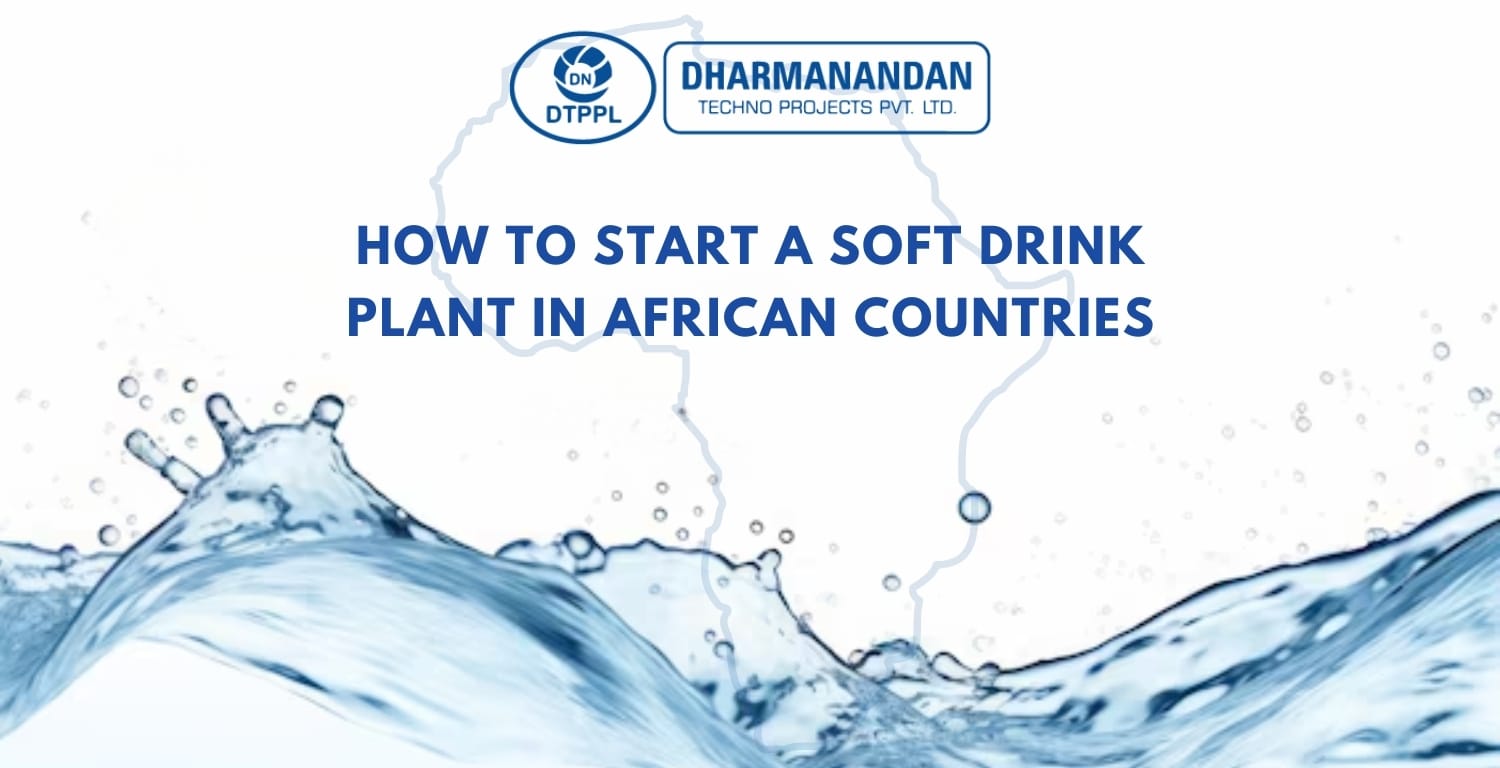
Table of Contents
How to Start a Soft Drink Plant in African Countries
September 8, 2024
The soft drink industry in Africa is experiencing rapid growth due to increasing urbanisation and a rising middle class. As more people move to cities and gain disposable income, the demand for convenient and refreshing beverages has surged. Soft drinks, particularly carbonated beverages, have become a staple in both social and cultural settings across various African countries. This presents a significant opportunity for entrepreneurs looking to enter the market.
Starting a soft drink plant in Africa requires a deep understanding of local markets, regulations, and consumer preferences. Each country presents unique opportunities and challenges, from navigating government regulations to ensuring access to quality raw materials. Understanding the specific needs of each market is key to success in the African soft drink industry.
Understanding the Demand for Soft Drinks in Africa
Market research is a crucial first step when considering starting a soft drink plant in Africa. Different regions and countries have varying consumer preferences, with some markets showing a preference for carbonated drinks, while others lean towards fruit-based beverages. Understanding these preferences will help in formulating the right product mix and ensuring success in the long run.
Africa’s beverage industry is diverse, with many local brands already catering to specific tastes. To compete effectively, it is essential to identify gaps in the market and offer products that resonate with consumers. Understanding trends, such as the rise in health-conscious beverages, can help differentiate your soft drink brand in this competitive space.
Overview of the Soft Drink Manufacturing Process
Setting up a soft drink plant requires an understanding of the manufacturing process. This involves several steps, including blending, carbonating, bottling, and packaging. Each step must be meticulously planned and executed to ensure the final product meets quality standards. Additionally, manufacturers need to consider the types of beverages they wish to produce, such as carbonated drinks, fruit juices, or energy drinks.
Quality control is a critical aspect of the soft drink manufacturing process. It ensures that every bottle produced is safe for consumption and meets the regulatory standards set by each country. Investing in modern equipment and technology can help streamline the process, improve efficiency, and reduce waste, ultimately leading to a more profitable operation.
Required Equipment and Technology for a Soft Drink Plant
Establishing a soft drink plant involves acquiring the necessary equipment, such as carbonation machines, bottling lines, and packaging systems. Each of these plays a vital role in the production process and ensures that the product is consistent and of high quality. It’s essential to invest in reliable and durable machinery that can withstand continuous operation in a commercial environment.
Advances in technology have made it possible to automate much of the soft drink manufacturing process. Automated systems can help reduce labour costs, increase production speed, and minimise human error. By integrating advanced technologies, manufacturers can stay competitive and meet the growing demand for beverages in African markets.
Legal Considerations and Licenses for Setting Up a Soft Drink Plant in Africa
Starting a soft drink plant in Africa involves navigating a complex web of legal requirements. Each country has its own set of regulations governing the food and beverage industry, including safety standards, packaging requirements, and environmental laws. It’s important to consult with local authorities and legal experts to ensure full compliance with these regulations.
Obtaining the necessary permits and licenses is crucial before beginning production. Failure to comply with legal requirements can lead to fines or even the closure of the plant. By understanding the legal landscape of the specific African country, you can avoid potential pitfalls and ensure smooth operations for your soft drink plant.
Identifying the Best Location for Your Soft Drink Plant
Choosing the right location for your soft drink plant is one of the most important decisions you will make. Proximity to raw materials, such as sugar, water, and flavourings, is a key factor to consider. Additionally, the location should be easily accessible to distribution networks, ensuring that your products can reach consumers quickly and efficiently.
The availability of skilled labour and the cost of utilities, such as electricity and water, are also important considerations. Some African countries offer tax incentives and other benefits to encourage manufacturing investments, so researching the local economic environment can provide significant advantages when choosing the plant’s location.
Soft Drink Plant in South Africa
South Africa’s soft drink market is one of the most developed in Africa, with major global brands already established in the region. The country has a well-established infrastructure, making it easier for new entrants to set up production facilities. However, the market is highly competitive, and businesses need to differentiate their products to stand out.
Regulatory requirements in South Africa are stringent, particularly in terms of food safety and environmental sustainability. Manufacturers need to adhere to these standards to ensure compliance and avoid penalties. Despite the challenges, South Africa’s growing urban population presents a lucrative opportunity for businesses looking to start a soft drink plant in the region.
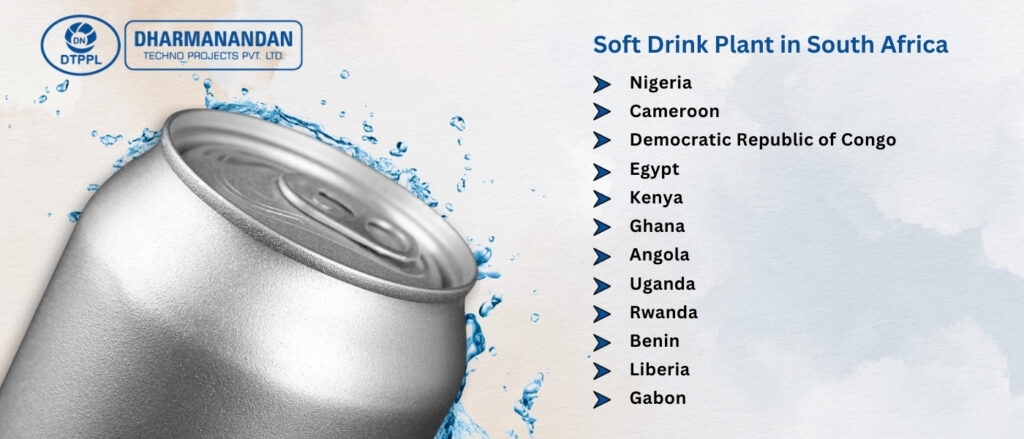
Which Kinds of Different Soft Drink Flavours and Packaging are Suitable in African Markets?
The African market is diverse, with varying consumer preferences depending on the region. To successfully penetrate this market, it’s crucial to offer flavours and packaging that resonate with local tastes and purchasing behaviors.
Popular Flavours
- Citrus-based Drinks: Lemon, lime, and orange flavours are immensely popular across Africa, appealing to the preference for refreshing, tangy beverages.
- Cola: Classic cola remains a staple in many African countries, often associated with global brands but with opportunities for local adaptation.
- Ginger-based Drinks: In several regions, particularly in West Africa, ginger-flavoured soft drinks are highly favoured, offering a spicy and invigorating alternative to traditional sodas.
- Exotic Fruits: flavours like mango, pineapple, and passion fruit cater to the local palate, providing a taste of the tropical fruits abundant in the region.
Packaging
- Single-Serve Bottles: Convenient and affordable, single-serve PET bottles (ranging from 250ml to 500ml) are a preferred choice among consumers, especially in urban areas.
- Returnable Glass Bottles: In many African countries, returnable glass bottles are still widely used, offering an eco-friendly and cost-effective packaging option.
- Cans: While less common, the use of aluminum cans is growing, particularly for premium and export-oriented products.
- Bulk Packaging: For large gatherings or family use, bulk packaging options like 1-liter or 2-liter bottles are popular.
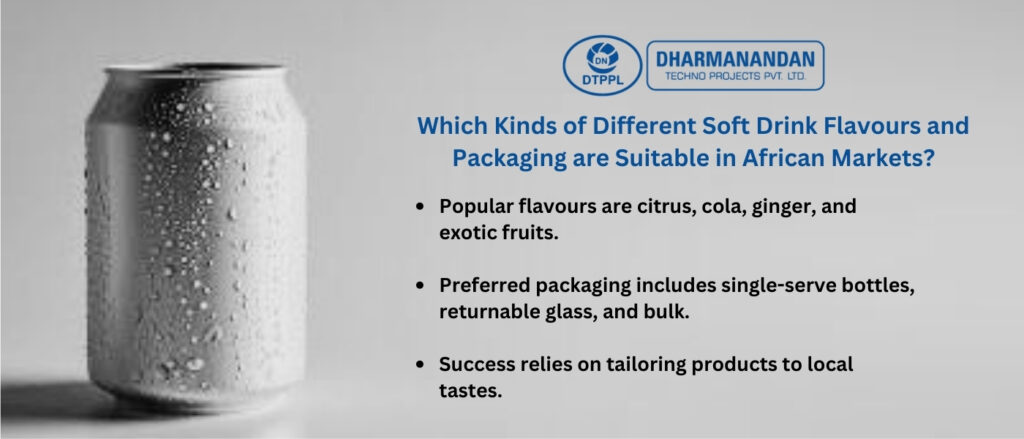
Juice Plant in South Africa: Opportunities and Challenges
In addition to soft drinks, there is a growing demand for juice-based beverages in South Africa. Health-conscious consumers are increasingly opting for natural and organic juices, creating a strong market for entrepreneurs interested in starting a juice plant. The process of juice manufacturing differs slightly from carbonated drinks, requiring specific equipment for extraction and pasteurisation.
Despite the demand, there are challenges associated with setting up a juice plant in South Africa. Access to fresh fruit, managing supply chains, and maintaining quality standards are all critical factors. Additionally, competition from established brands can make it difficult for new entrants, but innovative marketing and product offerings can create an edge.
Soft Drink Industry in Nigeria
Nigeria’s soft drink industry is one of the largest in Africa, driven by a large and growing population. The country’s hot climate also contributes to a high demand for refreshing beverages. Setting up a soft drink plant in Nigeria can be a profitable venture, but entrepreneurs need to navigate a competitive market with strong local and international brands already established.
Regulations in Nigeria can be challenging, particularly in terms of import duties and taxes on raw materials. However, local production can mitigate these costs and allow businesses to operate more efficiently. By understanding the local market and consumer preferences, businesses can successfully launch a soft drink plant in Nigeria.
Cameroon: Emerging Market for Soft Drinks
Cameroon is an emerging market for soft drinks, with increasing urbanisation and a growing middle class driving demand. The country’s beverage industry is still developing, providing an opportunity for new entrants to establish themselves before the market becomes saturated. Soft drinks are popular across all age groups, making it a promising industry for investment.
However, starting a soft drink plant in Cameroon comes with challenges, including limited access to raw materials and underdeveloped infrastructure. Entrepreneurs need to carefully consider these factors when planning their operations. Despite the hurdles, Cameroon’s growing economy and consumer base make it a market worth exploring for soft drink manufacturers.
Democratic Republic of Congo: Challenges and Opportunities
The Democratic Republic of Congo (DRC) presents a unique opportunity for soft drink manufacturers due to its large population and untapped market potential. As the country continues to rebuild its economy, demand for consumer goods, including beverages, is increasing. Entrepreneurs who can navigate the challenges may find significant growth opportunities in this expanding market.
However, operating in the DRC comes with its fair share of challenges. Political instability, poor infrastructure, and difficulties in obtaining raw materials can create obstacles for businesses. Despite these issues, the DRC remains a promising market, and companies willing to invest in the region may be able to secure a strong foothold as the market matures.
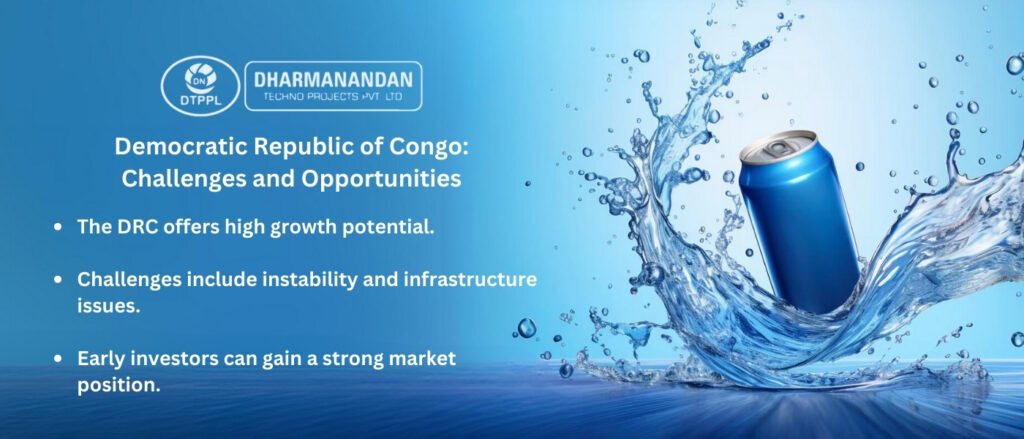
Egypt’s Booming Soft Drink Market
Egypt is one of the largest and most developed soft drink markets in Africa. The country’s large population and its strategic location as a gateway to both Africa and the Middle East make it an attractive destination for soft drink manufacturers. Egyptian consumers have a diverse palate, and there is demand for both carbonated drinks and fruit juices.
Operating in Egypt comes with certain advantages, including relatively advanced infrastructure and a favourable regulatory environment for manufacturers. However, competition is stiff, with both local and international brands vying for market share. Businesses need to offer innovative products and strong branding strategies to succeed in Egypt’s competitive beverage market.
Kenya: Soft Drinks and Consumer Preferences
Kenya is another promising market for soft drink manufacturers, with a young and increasingly urban population driving demand for ready-to-drink beverages. Soft drinks are a popular choice among Kenyan consumers, with both carbonated drinks and non-carbonated options like flavoured water and juices gaining popularity. The country’s well-developed retail sector provides easy access to consumers.
The Kenyan market is also seeing a rise in health-conscious consumers, creating demand for beverages with lower sugar content or more natural ingredients. Entrepreneurs looking to enter the soft drink industry in Kenya should consider these trends and tailor their product offerings to meet local preferences, ensuring long-term success in this dynamic market.
Soft Drink Manufacturing in Ghana
Ghana’s soft drink market is growing steadily, with rising incomes and urbanisation contributing to increased demand. Soft drinks are popular among all age groups, making Ghana an appealing market for beverage manufacturers. The country’s economic stability and government support for local manufacturing create a favourable environment for starting a soft drink plant.
One challenge in Ghana is the competition from established international brands. Local manufacturers need to focus on creating unique product offerings that cater to Ghanaian tastes and preferences. Additionally, leveraging local supply chains and raw materials can help reduce production costs and increase profitability for businesses operating in the country.
Angola: An Untapped Market for Soft Drinks
Angola presents a significant opportunity for soft drink manufacturers due to its large and youthful population. While the country is still developing its infrastructure, there is increasing demand for beverages, particularly as disposable incomes rise. Entrepreneurs can take advantage of this growing market by setting up soft drink plants that cater to local tastes.
However, Angola’s soft drink industry is still in its infancy, with challenges such as high import costs for raw materials and limited access to reliable utilities. Businesses looking to enter the Angolan market will need to invest in infrastructure and supply chain management to ensure consistent production. Despite these challenges, Angola offers a promising market for long-term growth.
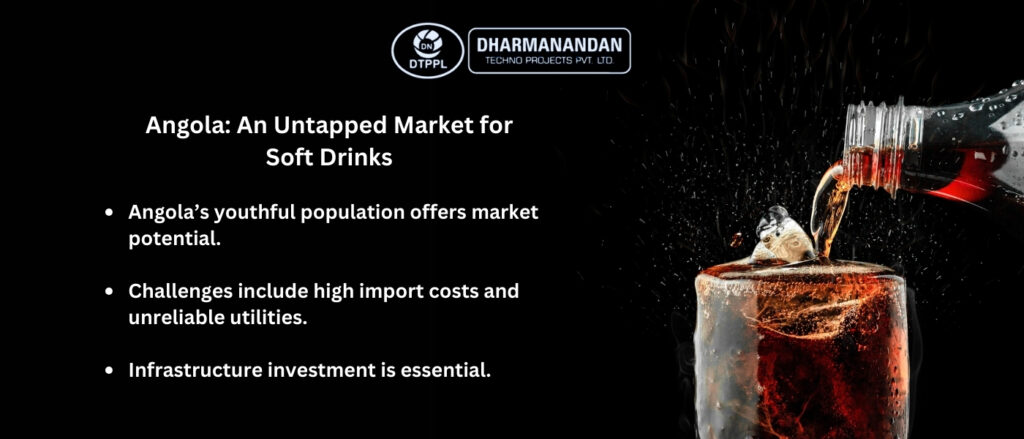
Uganda: Soft Drink Industry Outlook
Uganda’s beverage industry is steadily growing, with soft drinks becoming an integral part of social events and everyday consumption. The country’s warm climate and young population make it an ideal market for refreshing beverages. Entrepreneurs entering the Ugandan market can expect demand for both carbonated drinks and fruit-based beverages.
While Uganda offers many opportunities, it also comes with challenges such as inconsistent access to clean water and electricity. These factors can impact production efficiency and increase operational costs. However, with careful planning and investment in local resources, businesses can successfully establish a soft drink plant in Uganda and tap into its growing consumer base.
Rwanda: Sustainability in Soft Drink Manufacturing
Rwanda is emerging as a leader in sustainable manufacturing practices in Africa. The government has implemented policies to encourage eco-friendly business operations, making it an attractive market for businesses focused on sustainability. Entrepreneurs looking to start a soft drink plant in Rwanda can benefit from this emphasis on green production methods.
Sustainability is not only a regulatory requirement but also a market advantage in Rwanda, where consumers are increasingly conscious of environmental issues. Using recyclable packaging and minimising water usage in the manufacturing process can help companies build a positive brand image. With a growing consumer base, Rwanda offers a unique opportunity for businesses committed to sustainable growth.
Benin: Small-Scale Soft Drink Production
Benin offers opportunities for small-scale soft drink production, particularly for entrepreneurs interested in entering the beverage market on a modest budget. The country’s soft drink market is still developing, allowing new entrants to establish themselves without facing significant competition from international brands. Local production can help reduce costs and build strong connections with consumers.
One of the key challenges in Benin is limited access to modern manufacturing equipment, which may require businesses to start with smaller-scale production facilities. However, this can be an advantage for entrepreneurs who want to test the market before scaling up. With the right strategy, small-scale manufacturers can thrive in Benin’s growing beverage industry.
Liberia: Soft Drinks and Economic Growth
Liberia’s soft drink industry is poised for growth as the country continues to recover from economic challenges. With increasing stability and rising consumer demand for beverages, the soft drink market in Liberia presents a promising opportunity for entrepreneurs. The country’s hot climate further contributes to the high demand for refreshing drinks, making it an attractive market for manufacturers.
However, Liberia’s underdeveloped infrastructure and reliance on imports for raw materials can create challenges for soft drink production. Businesses will need to carefully manage supply chains and invest in local resources to ensure consistent production. Despite these challenges, Liberia’s growing consumer market offers significant potential for soft drink manufacturers willing to invest in the country’s future.
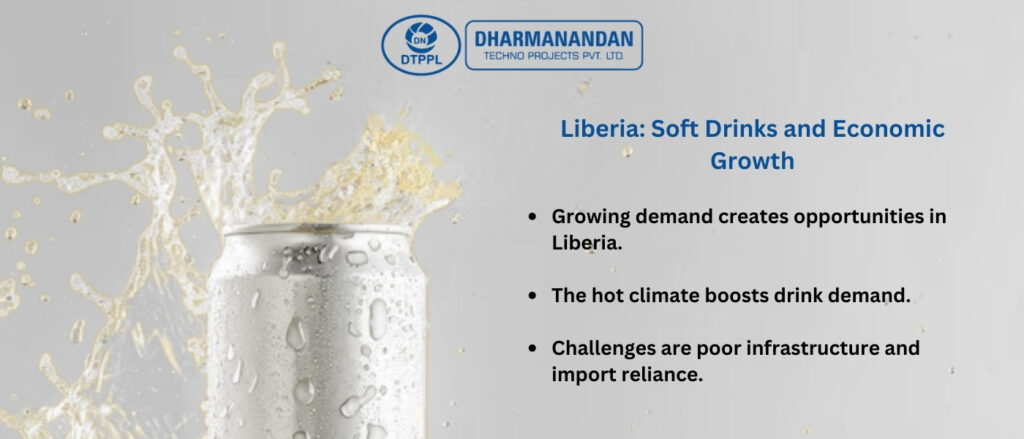
Gabon: Market Analysis for Soft Drink Entrepreneurs
Gabon’s small but growing soft drink market presents a niche opportunity for entrepreneurs. While the country’s population is smaller compared to other African nations, there is increasing demand for premium and imported beverages. Entrepreneurs can capitalise on this demand by offering unique and high-quality soft drink products that cater to Gabonese consumers’ preferences.
The main challenge in Gabon is the high cost of importing raw materials and equipment due to its limited local production capabilities. However, businesses that can establish efficient supply chains and focus on premium products may find success in this market. Gabon’s stable economy and growing middle class make it an attractive destination for soft drink entrepreneurs looking for niche opportunities.
Marketing Strategies for Soft Drink Brands in Africa
Marketing is a crucial element in the success of any soft drink brand in Africa. Due to the continent’s cultural diversity, it’s important to tailor marketing campaigns to local tastes and preferences. Using local languages, symbols, and cultural references can help brands connect with consumers on a deeper level and build brand loyalty.
Digital marketing is becoming increasingly popular in Africa, especially as internet access and smartphone usage rise. Social media platforms like Facebook, Instagram, and WhatsApp provide cost-effective ways to reach a wide audience. Combining traditional marketing strategies with digital outreach can help soft drink brands effectively engage with African consumers.
Distribution Channels for Soft Drinks in Africa
Effective distribution is key to the success of a soft drink plant in Africa. The continent’s infrastructure varies widely, so identifying the best distribution channels is essential for ensuring products reach consumers in a timely and cost-effective manner. Depending on the country, distribution may involve partnering with local retailers, wholesalers, or online platforms.
In some regions, direct-to-consumer distribution through small local shops or kiosks is common, while in others, modern retail chains play a dominant role. It’s important to tailor distribution strategies to the specific country’s market structure and consumer habits. Leveraging partnerships with established local distributors can also help new entrants navigate the complexities of the African market.
Sustainability and Eco-Friendly Practices in the African Beverage Industry
Sustainability is becoming increasingly important in the African beverage industry. As consumers become more aware of environmental issues, they are seeking out brands that prioritise eco-friendly practices. Soft drink manufacturers can gain a competitive edge by adopting sustainable production methods, such as using recycled materials for packaging and reducing water consumption.
Many African governments are also implementing regulations that promote environmentally responsible manufacturing. By complying with these standards, soft drink plants can not only avoid penalties but also build a positive brand image among consumers. Emphasising sustainability can also help attract investment from international partners interested in supporting green initiatives in Africa.
How DTPPL Can Help You Start a Soft Drink Business in Africa
DTPPL’s expertise goes beyond just manufacturing plants; they offer end-to-end solutions for setting up and running a successful soft drink business. Here’s how we can assist you:
Market Analysis and Feasibility Studies: DTPPL can conduct in-depth market research to identify the most suitable flavours and packaging types for your target region in Africa, ensuring that your product meets local consumer demands.
Custom Plant Design and Installation: DTPPL designs and installs soft drink manufacturing plants tailored to your specific needs, whether you’re starting small or scaling up. Our soft drink plants are equipped with the latest technology to ensure high efficiency and quality.
Regulatory Compliance: Navigating the regulatory landscape in African markets can be challenging. DTPPL provides guidance on local regulations, helping you ensure that your products comply with all necessary standards.
Ongoing Support and Training: DTPPL offers comprehensive training for your staff, along with ongoing technical support to ensure smooth operations. Our team of experts is always available to help troubleshoot issues and optimize production processes.
Supply Chain Management: From sourcing raw materials to managing distribution networks, DTPPL can help streamline your supply chain, ensuring that your products reach consumers efficiently and cost-effectively.
Brand Development and Marketing Support: Launching a new soft drink brand in a competitive market requires strategic marketing. DTPPL can assist with brand development, including packaging design and marketing strategies tailored to the African consumer base.
By choosing DTPPL as your partner, you’re not just investing in high-quality machinery but also in the expertise needed to succeed in the dynamic and growing African soft drink market.

Conclusion
The African beverage market presents diverse opportunities, with a range of flavours and packaging preferences that vary across regions. As businesses look to enter this dynamic market, it’s crucial to consider these factors carefully. DTPPL, with its experience in soft drink plant manufacturing, can offer valuable insights and support in navigating these choices. Whether you’re considering flavour profiles or packaging options like glass bottles, PET bottles, or cans, DTPPL can help guide your decisions to ensure a successful start in the African market.
Dharmanandan Techno Projects Pvt. Ltd. (DTPPL): Countries We Serve with Soft Drink Plant Solutions –
Algeria | Angola | Benin | Botswana | Burkina Faso | Burundi | Cape Verde | Cameroon | Central African Republic | Chad | Comoros | Democratic Republic of the Congo | Republic of the Congo | Djibouti | Egypt | Equatorial Guinea | Eritrea | Eswatini | Ethiopia | Gabon | Gambia | Ghana | Guinea | Guinea-Bissau | Ivory Coast (Côte d’Ivoire) | Kenya | Lesotho | Liberia | Libya | Madagascar | Malawi | Mali | Mauritania | Mauritius | Morocco | Mozambique | Namibia | Niger | Nigeria | Rwanda | São Tomé and Príncipe | Senegal | Seychelles | Sierra Leone | Somalia | South Africa | South Sudan | Sudan | Tanzania | Togo | Tunisia | Uganda | Zambia | Zimbabwe
About Author

Director – Global Marketing and Sales
Mr. Bhavesh from Dharmanandan Techno Projects Pvt. Ltd. has played a pivotal role in elevating the DTPPL brand to the global stage, leveraging his exceptional expertise in marketing and communications. He is committed to helping clients achieve significant growth while strengthening their own brands. Dharmanandan Techno Projects Pvt. Ltd. is a leading manufacturer and supplier of water purification systems and turnkey solutions for mineral water plants. With years of experience in designing and delivering high-quality water treatment solutions, the company provides end-to-end services, including system design, installation, maintenance, and ongoing support. Specializing in scalable and customizable water plants, DTPPL has successfully served industries worldwide, ensuring clean and safe drinking water across diverse applications.




